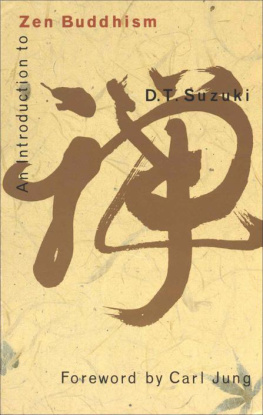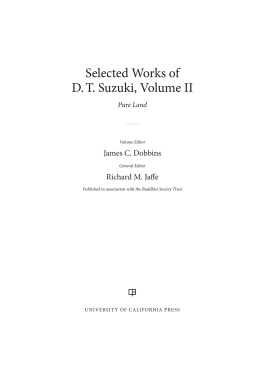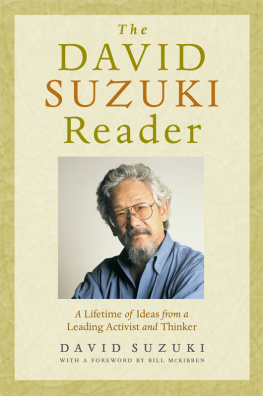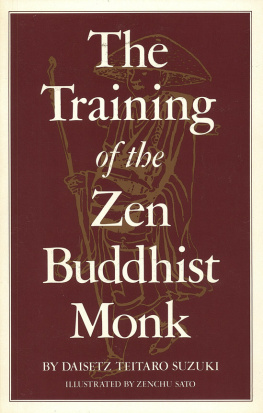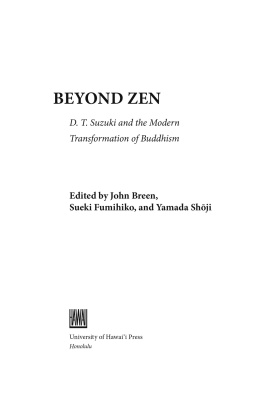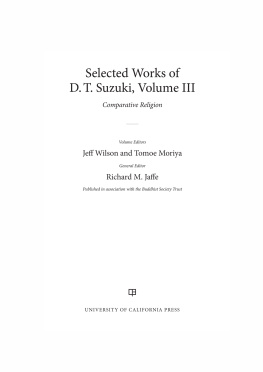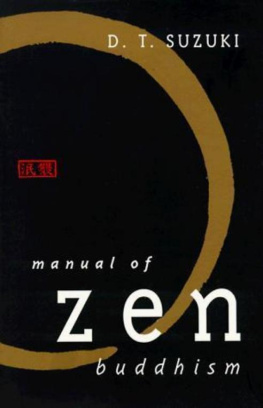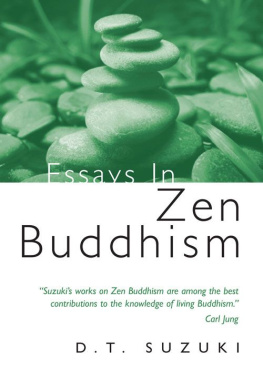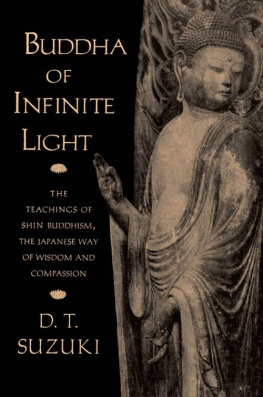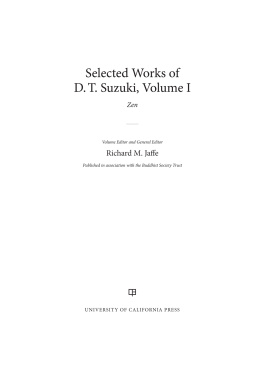Suzuki - An Introduction to Zen Buddhism
Here you can read online Suzuki - An Introduction to Zen Buddhism full text of the book (entire story) in english for free. Download pdf and epub, get meaning, cover and reviews about this ebook. year: 2007, publisher: Perseus Books Group, genre: Religion. Description of the work, (preface) as well as reviews are available. Best literature library LitArk.com created for fans of good reading and offers a wide selection of genres:
Romance novel
Science fiction
Adventure
Detective
Science
History
Home and family
Prose
Art
Politics
Computer
Non-fiction
Religion
Business
Children
Humor
Choose a favorite category and find really read worthwhile books. Enjoy immersion in the world of imagination, feel the emotions of the characters or learn something new for yourself, make an fascinating discovery.
An Introduction to Zen Buddhism: summary, description and annotation
We offer to read an annotation, description, summary or preface (depends on what the author of the book "An Introduction to Zen Buddhism" wrote himself). If you haven't found the necessary information about the book — write in the comments, we will try to find it.
An Introduction to Zen Buddhism — read online for free the complete book (whole text) full work
Below is the text of the book, divided by pages. System saving the place of the last page read, allows you to conveniently read the book "An Introduction to Zen Buddhism" online for free, without having to search again every time where you left off. Put a bookmark, and you can go to the page where you finished reading at any time.
Font size:
Interval:
Bookmark:
An Introduction to
ZEN BUDDHISM
Other works by D. T. Suzuki
Essays in Zen Buddhism
Manual of Zen Buddhism
ZEN BUDDHISM
DAISETZ TEITARO SUZUKI
With a Foreword by
Carl Jung

Copyright 1964 by D. T. Suzuki
All rights reserved. No part of this book may be reproduced in any form or by any electronic or mechanical means, including information storage and retrieval systems, without permission in writing from the publisher, except by a reviewer, who may quote brief passages in a review. Scanning, uploading, and electronic distribution of this book or the facilitation of such without the permission of the publisher is prohibited. Please purchase only authorized electronic editions, and do not participate in or encourage electronic piracy of copyrighted materials. Your support of the authors rights is appreciated. Any member of educational institutions wishing to photocopy part or all of the work for classroom use, or anthology, should send inquiries to Grove/Atlantic, Inc., 841 Broadway, New York, NY 10003 or permissions@groveatlantic.com.
Printed in the United States of America
Library of Congress Catalog Card Number 61-14383
eBook ISBN-13: 978-0-8021-9874-7
Grove Press
an imprint of Grove/Atlantic, Inc.
841 Broadway
New York, NY 10003
Distributed by Publishers Group West
www.groveatlantic.com
THE articles collected here were originally written for the New East, which was published in Japan during the 1914 War under the editorship of Mr. Robertson Scott. The editor suggested publishing them in book form, but I did not feel like doing so at that time. Later, they were made the basis of the First Series of my Zen Essays (1927), which, therefore, naturally cover more or less the same ground.
Recently, the idea came to me that the old papers might be after all reprinted in book form. The reason is that my Zen Essays is too heavy for those who wish to have just a little preliminary knowledge of Zen. Will not, therefore, what may be regarded as an introductory work be welcomed by some of my foreign friends?
With this in view I have gone over the entire manuscript, and whatever inaccuracies I have come across in regard to diction as well as the material used have been corrected. While there are quite a few points I would like to see now expressed somewhat differently, I have left them as they stand, because their revision inevitably involves the recasting of the entire context. So long as they are not misrepresenting, they may remain as they were written.
If the book really serves as a sort of introduction to Zen Buddhism, and leads the reader up to the study of my other works, the object is attained. No claim is made here for a scholarly treatment of the subject matter.
The companion book, Manual of Zen Buddhism, is recommended to be used with this Introduction.
D. T. S.
Kamakura, August 1934
by Dr. C. G. Jung
DAISETZ TEITARO SUZUKIS works on Zen Buddhism are among the best contributions to the knowledge of living Buddhism that recent decades have produced, and Zen itself is the most important fruit that has sprung from that tree whose roots are the collections of the Pali-Canon. We cannot be sufficiently grateful to the author, first for the fact of his having brought Zen closer to Western understanding, and secondly for the manner in which he has achieved this task. Oriental religious conceptions are usually so very different from our Western ones that even the very translation of the words brings one up against the greatest difficulties, quite apart from the meaning of the ideas exposed, which under certain circumstances are better left untranslated. I have only to mention the Chinese Tao, which no European translation has yet achieved. The original Buddhist writings themselves contain views and ideas which are more or less unassimilable by the average Western understanding. I do not know, for example, just what spiritual (or perhaps climatic?) background or preparation is necessary before one can deduce any completely clear idea from the Buddhist Kamma. In spite of all that we know about the essence of Zen, here too there is the question of a central perception of unsurpassed singularity. This strange perception is called Satori, and may be translated as Enlightenment. Suzuki says (see page 65), Satori is the raison dtre of Zen, and without it there is no Zen. It should not be too difficult for the Western mind to grasp what a mystic understands by enlightenment, or what is known as enlightenment in religious parlance. Satori, however, depicts an art and a way of enlightenment which is practically impossible for the European to appreciate. I would point out the enlightenment of Hyakujo (Pai-chang Huai-hai, A .D. 724-814) on page 59, and the legend on pages 62-3 of this book.
The following may serve as a further example: A monk once went to Gensha, and wanted to learn where the entrance to the path of truth was. Gensha asked him, Do you hear the murmuring of the brook? Yes, I hear it, answered the monk. There is the entrance, the master instructed him.
I will be content with these few examples, which illustrate clearly the opacity of the satori experiences. Even if we take example after example, it is still extremely hazy how such an enlightenment comes and of what it consists; in other words, by what or about what one is enlightened. Kaiten Nukariya, who was himself a Professor at the So-To-Shu Buddhist College in Tokyo, says, speaking of enlightenment:
Having set ourselves free from the misconception of Self, next we must awaken our innermost wisdom, pure and divine, called the Mind of Buddha, or Bodhi, or Prajna by Zen Masters. It is the divine light, the inner heaven, the key to all moral treasures, the source of all influence and power, the seat of kindness, justice, sympathy, impartial love, humanity, and mercy, the measure of all things. When this innermost wisdom is fully awakened, we are able to realize that each and every one of us is identical in spirit, in essence, in nature with the universal life or Buddha, that each ever lives face to face with Buddha, that each is beset by the abundant grace of the Blessed One, that He arouses his moral nature, that He opens his spiritual eyes, that He unfolds his new capacity, that He appoints his mission, and that life is not an ocean of birth, disease, old age and death, nor the vale of tears, but the holy temple of Buddha, the Pure Land, where he can enjoy the bliss of Nirvana.
Then our minds go through an entire revolution. We are no more troubled by anger and hatred, no more bitten by envy and ambition, no more stung by sorrow and chagrin, no more overwhelmed by melancholy and despair, etc.
That is how an Oriental, himself a disciple of Zen, describes the essence of enlightenment. It must be admitted that this passage would need only the most minute alterations in order not to be out of place in any Christian mystical book of devotion. Yet somehow it fails to help us as regards understanding the satori experience described by this all-embracing casuistry. Presumably Nukariya is speaking to Western rationalism, of which he himself has acquired a good dose, and that is why it all sounds so flatly edifying. The abstruse obscurity of the Zen anecdotes is preferable to this adaptation: ad usum Delphini; it conveys a great deal more, while saying less.
Next pageFont size:
Interval:
Bookmark:
Similar books «An Introduction to Zen Buddhism»
Look at similar books to An Introduction to Zen Buddhism. We have selected literature similar in name and meaning in the hope of providing readers with more options to find new, interesting, not yet read works.
Discussion, reviews of the book An Introduction to Zen Buddhism and just readers' own opinions. Leave your comments, write what you think about the work, its meaning or the main characters. Specify what exactly you liked and what you didn't like, and why you think so.

